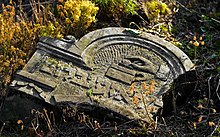Jewish cemetery

A Jewish cemetery (Hebrew בית עלמין) ("beit alamin" or "beit kvarot") is a cemetery where members of the Jewish faith are buried in keeping with Jewish tradition.
Known in Hebrew as "house of eternity," the land of the cemetery is considered holy and a special consecration ceremony takes place on its inauguration. Establishing a cemetery is one of the first priorities for a new Jewish community. A Jewish cemetery is generally purchased and supported with communal funds.[1]
History


Early Jewish cemeteries were located outside of the city. In the Diaspora, it is traditional to bury the dead with the feet in the direction of Jerusalem. The tombstones usually have inscriptions in Hebrew and the regional language. During the Nazi Germany regime, Jewish cemeteries all over Europe were destroyed and desecrated.
The largest Jewish cemeteries of Europe can be found in Budapest, Łódź, Prague, Warsaw and Berlin. Other Jewish cemeteries in Europe include the Jewish Cemetery in Khotyn.
In the United States, the Coming Street Cemetery, in Charleston, South Carolina, Mikveh Israel Cemetery in Philadelphia, Pennsylvania, Hebrew Cemetery in Richmond, Virginia, B' Nai Israel Cemetery in Ashland, Wisconsin, and the Old Jewish Cemetery in Cincinnati, Ohio are some of the country's oldest Jewish cemeteries.
The mission of the International Jewish Cemetery Project is to document every Jewish burial site in the world. [2]
